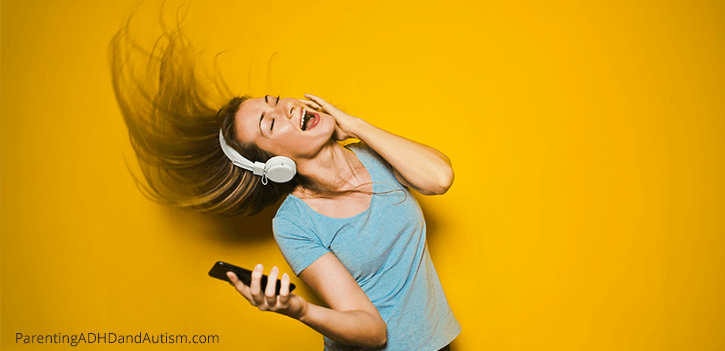How to Make the Teen Years Transformative for Kids with ADHD/ Autism
How to Make the Teen Years Transformative for Kids with ADHD/ Autism

Guest post by Kimberly Beaman, LMHC
Oh, the teenage years. We all were teens once, but we forget what the experience was really like. Of what I can recall, it was a period of many emotions, at roller coaster speed. I don’t have teenage kids yet, but I have worked with many teens over the years as a licensed mental health counselor in Florida. I can tell you one thing: Teens are like sponges, eager to understand and absorb their own world and curious about other’s perceptions. Their brains are constantly taking in the sensory experience around them. Through meeting teens who have undergone major hardships or traumatic experiences, I have also learned that teenagers are resilient. They may not know their own resilience right off the bat, but they have the capacity to know.
What teens want more than anything is validation and to feel understood. This is why teens often respond to music. It’s the rhythm of their heart. The mood that the melody sets in songs speaks volumes. If it’s not music, it will be another form of art. Life is art. Art is life.
This is why I advise parents to collaboratively find or encourage your child to find the gifts of their soul. It’s okay if your teen has no clue what that gift(s) is yet. The idea is to be willing to experiment and to reflect, encourage, and validate along the journey of discovery. You can also seek support from a qualified therapist, with many types of therapies to choose from.
When I started my master’s degree counseling program, the word “validate” was unknown. We all naturally respond to other’s needs and validate them without knowing time and again. BUT, what is most important is the consistency of that validation.
Case in point… Teen is in a solemn mood (face withdrawn, barely speaking) and murmurs that he is “over it all.” Upon further inquiry, teen says “I have had it. I can’t deal with the arguments at home.” A validation would be to say reflectively, “You are over it,” or, “I hear that you are really upset.” After a validation, it may be appropriate to inquire further.
These communication skills are often addressed in counseling, so they can be practiced in day-to-day life. The goal is to be present and to allow your teenager to express him- or herself in a safe and effective way, given communication is open and empathic.
Validation is simply affirmation that a person, their feelings, or their opinions are valid or worthwhile (even if you don’t agree with them). Kids really want to be heard. You can be the person in their life that makes a difference.
Kimberly Beaman, LMHC
 At a very young age. Kimberly was diagnosed with Dyslexia and ADD. Her determined mother used alternative teaching methods through music and tactile experiences to support her during the formative years. She went on to earn her BA in Psychology and MA in Counselor of Education; Community Mental Health. She is also a Licensed Mental Health Counselor and has worked with children of all ages, as well as adults. Kimberly thoroughly enjoyed additional experience as an Accessibility Consultant supporting people with accommodations at the University of Central Florida.
At a very young age. Kimberly was diagnosed with Dyslexia and ADD. Her determined mother used alternative teaching methods through music and tactile experiences to support her during the formative years. She went on to earn her BA in Psychology and MA in Counselor of Education; Community Mental Health. She is also a Licensed Mental Health Counselor and has worked with children of all ages, as well as adults. Kimberly thoroughly enjoyed additional experience as an Accessibility Consultant supporting people with accommodations at the University of Central Florida.
Kimberly’s passion for the Liberal Arts has led her to professional acting gigs, singing, songwriting and now the creation of Accessible Books for Children, LLC. Her main objective is to provide character based books that support young learners by creating an optimal learning experience through story and song. Kim is proud of her accomplishments and thankful for the experiences that have led her to fully appreciate her talents. She wants others to know that they can achieve their dreams, never to give up and to know they are not alone. Visit kimberlybeaman.com to learn more.



I am truly curious with this question: when you validate someone’s feelings, do you ever get push back along the lines of “I just said that!” I say this because I can remember as a teen (in college, but still a teen) going to a counselor because I was having significant issues with a roommate. I told her what was happening, and she would parrot it back to me, maybe not using the same words – but essentially repeating what I had said; validating it. I cannot tell you how much I hated it. I didn’t say that, but I kept thinking of it. And I’ve experienced it since then in other therapy and while I can understand what’s going on and rationalize it, it completely unnerves me. Maybe I am unique, but I often find the more we think our way of doing something is unique, the more common our experience is.
I know exactly what you mean. When someone uses my name in conversation it always feels very patronizing to me.
When I do reflective listening, I always try to change the wording. So, if my son says “I’m so angry right now,” I’d say, “I can see how agitated you are right now. Thanks for sharing how you’re feeling with me. If ______ happened to me, I’d be frustrated too.”
Reflective listening, validating feelings, and offering empathy. That’s ideal. Does it work every time? Of course not. ????
I appreciate your comments above. I am just seeing the messages above and always welcome feedback and conversation. As a licensed therapist, a mother and as an individual who has experienced therapy myself; I do understand what ‘Dee’ from 2018 post has shared. I have experienced “validation” as reflective listening which was well received but I have also been frustrated with a more simplified, repetition of my words. I do feel it’s very important to empathize, seek to understand just as much as it is helpful to use reflective listening and validation. Thanks for your posts! Kim